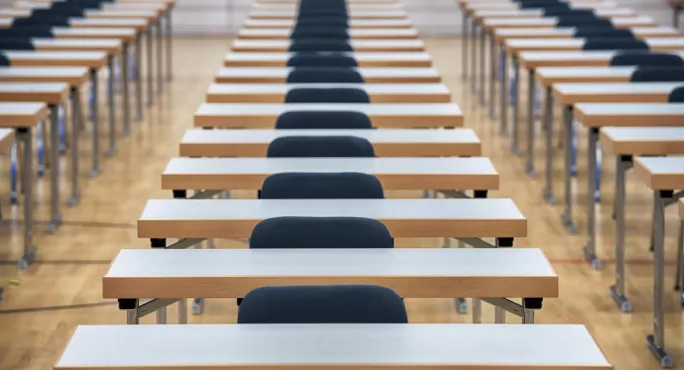- Home
- ‘The GCSE rite of passage has been taken away’
‘The GCSE rite of passage has been taken away’

“Keep focused on why we are here: your GCSEs.”
GCSEs have been in place every year since 1988. They are the key assessment point at the end of five years of secondary school.
“You’re misbehaving? How will this impact your GCSEs?”
Unlike A-levels or degrees, they are the qualification that all teenagers take and that are most likely to appear on every CV.
“You didn’t do your revision homework? If you muck up these then this could ruin your chances at A level, your choice of university, your job prospects.”
These are the mantras that the class of 2020 - students who were due to take their GCSEs this May and June - have heard for the past few years in schools up and down the country. All is built up to prepare for a feeling of success in that defining moment in August when results are opened.
At 6.45am last Wednesday, I arrived in school to finish revision resources for students to take home and then created a plan to teach in a single lesson what is usually taught in one month. They’ll need to hear about the content from me first, then they can consolidate learning at home. The lesson was in full flow by 10am. “Sir, what was the IRA?” No time to go into that, sorry. The class, that I had taught since Year 9, had not seemingly contemplated that this could be our last lesson together. I was aware of the very real possibility it would prove to be but acted as if there would be at least a few more before exams.
Will coronavirus lead to changes in our exam system?
There were no goodbyes. Just orders from me and agreement from them that they needed to revise.
At 2pm, as I was printing resources adjacent to a classroom, I saw news about schools shutting down in Scotland and Wales. I could see my colleague was going through an exam paper and heard the enthusiastic answers of students. They were ready.
It was only then, after days of denial, that I began to accept that their confidence was likely to soon become redundant. Staff started to know, too, smiling with students as they went to their final session of the day. A Year 11 student, who had been a particular challenge all year, observed: “They are only being nice to us because we are about to die.”
The Year 7s were the most confused, understandably. “Are we going to go into lockdown?” “How long is school closing for?” Teachers are meant to provide certain answers to questions. Or at least make up plausible ones. Usually, people are older than this when they realise that adults don’t know everything. I had nothing to give. These Year 7s are growing up quick. But they will adjust, they’ll look back fondly about this in four years’ time when they sit their GCSEs.
I received an email at 4pm from a student asking for catch-up work from the lesson she missed. She was aiming for a 9, the top GCSE grade. One hour later, as education secretary Gavin Williamson stood up to address the Commons and Boris Johnson addressed the press pack, my reply with resources became irrelevant. GCSEs aren’t going ahead this May and June. School’s out. It’s cancelled.
The rite of passage has been taken away for the class of 2020. One of my students I bumped into in the corridor the following day joked “We’ll be a history question on future exam papers: ‘What was the academic year that didn’t do GCSEs?’” They will get some results, but it won’t be in the authentic way cohorts did before them and no doubt will after them. Students will have a rough idea what they are going to get. For them, there will be no sweaty, tingling fingers and racing hearts holding a letter containing information which they know close to nothing about. On Thursday morning, the headteacher confirmed: “This will be their last day at school.” No special leaving events for them. Prom is off.
According to Saima Rana, headteacher of Westminster Academy Paddington: “Telling students now that there are no exams stops their whole purpose in learning.” Perhaps this is the nub of the issue. The rug has been pulled from beneath their feet and, with that, the purpose of school and the meaning of their education.
For five years, secondary schools funnel kids down to the pressure point of May/June of their Year 11 year. This is where they get their raison d’être from. I read of some imploring teachers telling students: “It wasn’t just about the GCSE qualifications, it was the learning.” Such pleas ring hollow when arising in a vacuum. You can’t magic up a new meaning of education for students in 24 hours when the main thing they hear about - day in, day out - is GCSEs.
Perhaps if there is any consolation from this crushing blow to the education system, it might be the encouragement of schools, and thus their students, to see school as being about more than exam qualifications. That education is sacred and worthwhile for its own sake. That a broad education is preferable on so many levels to a narrow, exam-driven one. It’s something. But I doubt it will offer much comfort to the class of 2020.
Adam Seldon is a secondary school history teacher and head of character, charity trustee and writer. He tweets at @adamJseldon
Keep reading for just £1 per month
You've reached your limit of free articles this month. Subscribe for £1 per month for three months and get:
- Unlimited access to all Tes magazine content
- Exclusive subscriber-only stories
- Award-winning email newsletters

